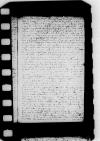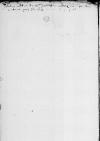Quod hucusque Dominationis Vestrae Reverendissimae non responderim ⌊⌋ datis VII huius, in causa fuit invalitudo ⌊fratris mei Bernardi⌋, de qua ⌊⌋. Qui cum paulo ante melius habere coeperit, per aliquot
dies ⌊⌋, ⌊caesaris⌋[1], ⌊Romanorum regis⌋, et ad ⌊⌋ intendi, herique illum, ut pro conficiendis rebus nostris ⌊Cracoviam⌋ proficiscatur, a me dimisi cum duobus millibus nostris, quos numeratos ac consignatos relicturus est apud ⌊fratrem ⌊domini Iosti Ludovici⌋⌋ ⌊Thoroniae⌋. ⌊⌋, ut ratione veteris inter me et illum amicitiae de istiusmodi duobus millibus ducatis c text damaged⌈[c]c text damaged⌉um ⌊Georgio Hegel⌋, quo in ⌊urbe⌋ ad usus nostros reponantur, responderet, quod ipsum haud dubie facturum spero. Sin minus, ⌊Georgius Hegel⌋, per litteras ⌊Iacobi Ludovici⌋ certior de pecunia reposita factus, efficiet, ut ⌊domini Fuggari⌋ eam pecuniam eo modo, ut inter nos convenimus, ⌊domino Theodorico⌋ ad expeditiones nostras dispensent etc.
Recepi recens ⌊⌋, quas ⌊Georgius Hegel⌋ mihi misit, in quibus fere supra humanitatem se mihi offert, maxime in casu, si negotium Varmiense pro me succederet, non mille solum, sed etiam in pluribus. Eas litteras Dominationi Vestrae Reverendissimae misissem, si non visum mihi fuisset ex re nostra fuisset esse, ut eas ⌊Georgius Hegel⌋ legeret. Quas igitur ⌊frater meus⌋ secum tulit. ⌊⌋, quomodo res nostra omnis haberet, neque defuit Dominationis Vestrae Reverendissimae honesta mentio, et quod pecuniae nostrae ⌊Thoroniae⌋ essent depositae, ob quas, ut cum factore, ut vocant, suo fierent tractatus, ⌊fratrem meum⌋ misissem ⌊Cracoviam⌋, adiecta condicione, quod sic ⌊Romae⌋ conservarentur, ne a procuratoribus[2] sciretur numerus, sed illis ea dumtaxat darentur, quae essent expeditioni necessaria, residuum pro nobis remaneret. Quod si etiam plus in omnem eventum, quam summa nostra continet, ⌊Romae⌋ peteretur, quod ipse pro nobis sponderet, quousque de eo certiores redderemur. Eadem et ⌊⌋, sic quod certo arbitror rem pro votis nostris Deo prosperante successuram. Quae ⌊⌋, habebit Dominatio Vestra Reverendissima in exemplo iis addito litterarum mearum, iuxta quod res Dominationis Vestrae Reverendissimae apud ⌊maiestatem regiam⌋ dirigi oportebit, eadem item et ⌊Georgio Hegel⌋ significavi, ut quam primum bullam ⌊maiestati regiae⌋ inscriptam acceperit, illam reddat, et pro Dominatione Vestra Reverendissima litteras regias ad capiendam possessionem conscriptas cum primis ad Dominationem Vestram Reverendissimam mittat. Itidem et mecum actum est.
Ego interim quamdiu titulo episcopi Culmensis utor in postulatione non
confirmatus, administrabo per meos non secus, atque si ego ipse hic sim mansurus, minusque decedet, quam si ⌊capitulum⌋ administraret, quod me vivo et episcopo adhuc
existente fieri non ... illegible⌈...... illegible⌉ convenit. De censibus quaedam debita pro mensa episcopali et familiae erit solvendum, reliquum manebit Dominationi Vestrae Reverendissimae integrum. Quod ea cura et absens per ⌊nepotem meum⌋[3], quem hic praeficiam, et alios meos officiales tractabo, quemadmodum mutuus noster fraternus amor postulat, meque ms. neque(!)
⌈mequemeque ms. neque(!)
⌉ ullam de me cf. Adagia 1526 No. 304 Ansam quaerere ⌊conquerendi relinquam ansamcf. Adagia 1526 No. 304 Ansam quaerere ⌋
etc.
De taxa Dominationis Vestrae Reverendissimae quae ⌊⌋ ⌊reverendissimo domino cardinali Pistoriensi⌋, cum quo mihi in ⌊Hispaniis⌋ et ⌊Italia⌋ fuit non parva familiaritas, ex ⌊⌋ intelliget. Eademque ⌊regiae⌋ et ⌊reginalique maiestati⌋ et ⌊reverendissimo domino Cracoviensi⌋ ⌊fratri meo⌋ ut referret, iniunxi, neque ambigo, quin non
gravate praescriptae a Dominatione Vestra Reverendissima litterae dabuntur ad ⌊pontificem⌋ et ad ⌊cardinalem protectorem⌋ etc.
Quod ⌊hinc⌋ abire debeo, a loco consueto et grato, non potest citra animi mei fieri molestiam, quae tamen, cum cf. Rhet. Her. 4(7).10 tempus postulat; Cic. Tusc. 2(4).11; Rhet. Her. 2(29).46; Rhet. Her. 4(1).1 ratio postulat ⌊sic ratio et tempus postulatcf. Rhet. Her. 4(7).10 tempus postulat; Cic. Tusc. 2(4).11; Rhet. Her. 2(29).46; Rhet. Her. 4(1).1 ratio postulat ⌋, vincenda est. Collectis itaque reculis meis, quas per meos ⌊hic⌋ subditos, ne quem in ⌊novo dominio⌋ onerare videar, iis diebus praemittam, ipse hinc ipso 1537-12-04⌊die sanctae Barbarae1537-12-04⌋ subsequar, noctem habiturus in ⌊Fridrichwaldt⌋[4], 1537-12-05⌊posterum diem1537-12-05⌋ in ⌊Gutstat⌋, 1537-12-06⌊perendino1537-12-06⌋, post auditum sacrum, cum Deo et sancto Nicolao ingressurus ⌊Heilsberg⌋. Idipsum canonicis fratribus nostris Dominatio Vestra Reverendissima communicare poterit, quas[5] fraterne  BCz, 244, p. 316 salvere iubeo, et Dominationem Vestram Reverendissimam paper damaged⌈[m]m paper damaged⌉ felicissime valere ex animo cupio.
BCz, 244, p. 316 salvere iubeo, et Dominationem Vestram Reverendissimam paper damaged⌈[m]m paper damaged⌉ felicissime valere ex animo cupio.
 BCz, 244, p. 316 salvere iubeo, et Dominationem Vestram Reverendissimam paper damaged⌈[m]m paper damaged⌉ felicissime valere ex animo cupio.
BCz, 244, p. 316 salvere iubeo, et Dominationem Vestram Reverendissimam paper damaged⌈[m]m paper damaged⌉ felicissime valere ex animo cupio.

